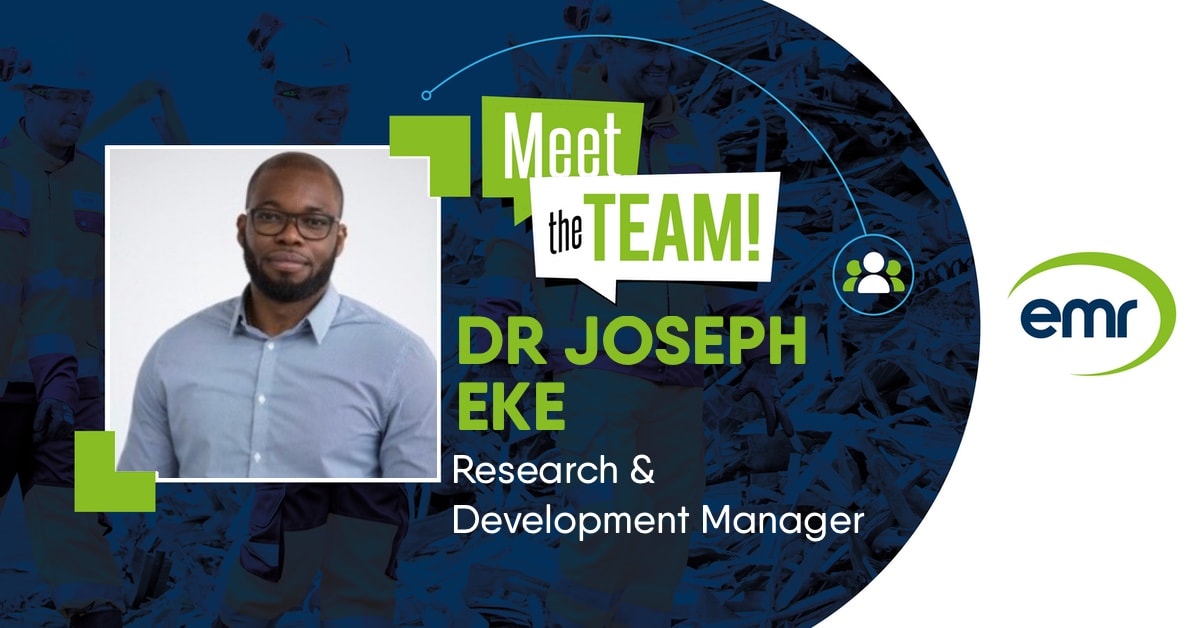CHOOSE
A DIFFERENT TERRITORY
"My role is to work alongside the rest of team to find challenges and opportunities where we can divert material away from landfill,” says Dr Joseph Eke, EMR’s Research & Development Manager.

As EMR works hard to meet its goal to be a fully net-zero recycler by 2040 (part of its ‘sustainability’ strategy), the innovation and research Joseph leads will be at the heart of the firm’s future success.
The latest project that Joseph and his team is working on is RECOVAS, a consortium part-funded by the UK Government’s Advanced Propulsion centre and, led by EMR, and involving three leading UK car makers, plus a group of industry and academic partners. RECOVAS will create a large-scale supply chain for the processing of end-of-life electric vehicle (EV) batteries in the UK.
“We need to create a depollution process to safely remove the batteries from the cars and then triage them for remanufacturing, reuse or recycling. For the batteries that need to be recycled, we are, utilising new technology to recover the cobalt, nickel, lithium carbonate and other valuable components. We are effectively creating a brand-new circular supply chain,” he says.
This project is important for the automotive industry as it will ensure that key strategic battery materials are retained within the UK. Creating the processing capability now is important for processing EV prototypes and early failures, but also the growing number of Hybrid vehicles reaching end of life.
While the age of most of these vehicles means the volumes of batteries in need of processing is still low, the work Joseph and his team is doing today will prepare EMR for much higher volumes of end-of-life EVs during the years ahead.
“If we set the benchmarks to improve our systems now, we will find it much easier to ramp up our process later on,”
Of course, EMR’s teams have many decades of experience in recycling end-of-life vehicles but Joseph says that the challenges which EVs present means processing them – and their batteries– requires a whole new set of skills.
“Everything is different with EVs, whether that’s the equipment we use or the depollution processes we need to follow. EMR is working with the Health & Safety Executive to develop best practice guidance and training for internal and external operators, it puts us well ahead of the market. It’s going to be a game changer.”
The increased complexity involved with processing EV batteries is one of the reasons why EMR has sought to build a consortium of partners across industry and academia.
“Manufacturers have historically been hesitant to share things such as intellectual property with recycling firms like EMR but, at the same time, they have come to realise that one individual business can’t solve this challenge alone – it has to be a collaborative effort.”
And, when it comes to working closely with academia, Joseph’s experience has also proved invaluable.
“Before I joined EMR, I was finishing off my PHD in chemical engineering at Aston University, where I focused on waste management and waste to energy. So, I know first-hand how important it is for businesses like EMR to have academic partners – you need to collaborate with the people at the forefront of academic research.”
For the RECOVAS project this has meant working with the University of Warwick and its WMG (Warwick Manufacturing Group) research department.
“They are helping to develop the recycling process that will be used to recycle end-of-life battery packs, where they cannot be repurposed or remanufactured.”
While the research and development that Joseph and his team are involved in is vital to both EMR’s sustainability goals and society’s wider efforts to achieve a circular economy, he is happy to admit that his work is also personally rewarding.
“I enjoy waking up early and coming into work every day to engage with so many different elements of the business. The amount of innovative equipment and processes I get to work with is mindboggling.”
Luckily for Joseph, EMR’s continued need for state-of-the-art solutions means there will be many more opportunities like RECOVAS for him to work on in the months and years ahead.
Read about our sustainability commitments and our plan to be net-zero by 2040.